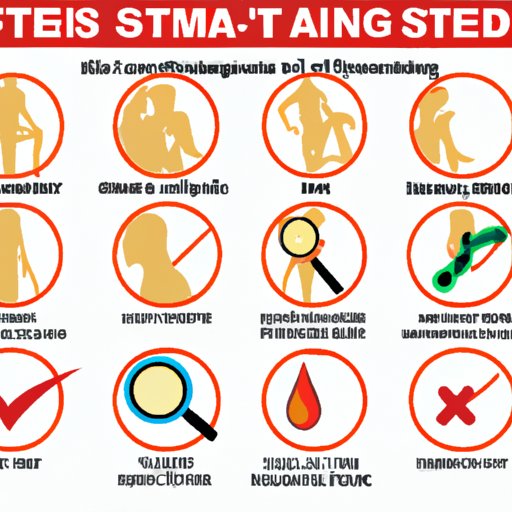
Introduction
Sexually transmitted diseases (STDs) are a major public health concern worldwide. The World Health Organization estimates that over 1 million STDs are acquired by people every day. STDs can be asymptomatic, and many people may not realize they are infected until it is too late. This article aims to explore the different symptoms of STDs that you should be aware of. We will comprehensively cover the common, early warning, and hidden signs of STDs, when to get tested, and how to manage the condition.
10 Common STDs Symptoms You Should Be Aware Of
Recognizing the signs and symptoms of STDs is crucial in order to get early diagnosis and treatment. The most common STD symptoms are:
- Painful urination
- Unusual discharge from the genital area
- Itching or burning sensation in the genital area
- Bumps or sores in the genital area
- Swelling or redness near the genital area
- Painful intercourse
- Sore throat
- Fever
- Headache
- Rash on the palms and soles of the feet
If you experience any of these symptoms, seek medical attention. Treatment will depend on the type of infection and may involve medication or other interventions like surgery. The earlier the intervention, the better the prognosis.
The Early Warning Signs of STDs: What You Need to Know
Some STDs may cause early warning signs that should not be ignored. These early symptoms include:
- Unusual genital discharge
- Itching, burning or tingling sensations around genital area
- Painful urination
- Bumps, blisters or sores around genital areas
If you experience any of these early symptoms, see a doctor right away. Early diagnosis and treatment can prevent further complications. Prevention is key, you can protect yourself from STDs by using protection during sexual intercourse. Being in a monogamous relationship with an STD-free partner also helps.
The Hidden Signs of STDs: What You Might Be Missing
STDs can also cause hidden or atypical symptoms that may be mistaken for something else. These symptoms are often overlooked but should be taken seriously. Some of these symptoms include:
- Chills or fever
- Rash or bumps on the skin
- Joint pain
- Fatigue
- Nausea or vomiting
- Abdominal pain
These symptoms can indicate a serious complication if left untreated. If you notice any of these symptoms, you should seek medical attention immediately. Sometimes, you may have an STD but experience no symptoms, it is still necessary to get tested regularly.
STD Testing 101: When to Get Tested and What to Expect
STD testing is important, especially if you are sexually active or have recently engaged in sexual activity with a new partner. You should consider getting an STD test if:
- You’ve had unprotected sex
- You’ve had sex with multiple partners
- You’ve experienced any of the symptoms mentioned above
There are several types of tests, and the kind of test you receive will depend on your symptoms and sexual history. Some tests require a blood sample, while others require urine or swabs from the genital area. The testing process is usually quick, and results are typically available within a week. Be prepared to discuss your symptoms with your doctor or nurse. They may ask you some questions to help determine whether you need tests for specific STDs.
Living with an STD: Coping with Symptoms and Stigma
A diagnosis of an STD can be emotionally and psychologically distressing. Many people suffer from anxiety, depression, or shame due to stigma and discrimination. It is important to know that it is okay to feel overwhelmed. Seeking help and support is critical in coping with an STD diagnosis.
The first step in managing an STD is to understand the condition, its symptoms and possible treatment options. Your doctor or nurse can provide the necessary information and guidance. It is essential to take your medications regularly if prescribed. They help manage symptoms, reduce the risk of transmission, and prevent further complications.
It is crucial to find support from friends, family, or support groups. Talking about your feelings and concerns with someone can help reduce anxiety and stress levels. If you feel stigmatized or discriminated against, speak to your doctor, nurse, or counselor about how to deal with it.
Conclusion
Sexually transmitted diseases are prevalent, but early diagnosis and treatment can prevent complications. Be aware of the different symptoms of STDs and seek medical attention if you notice any of them. Practice safe sex, get tested regularly, and seek help and support if diagnosed with an STD.





